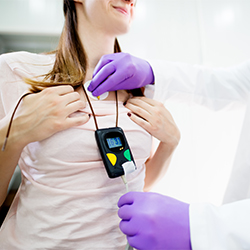For Long-Term Recording of Data About Your Heart, We Offer the Holter Monitor

When you have irregular heartbeats or other heart conditions like an Arrhythmia, where your heart seems to skip a beat, rapidly races, or works a bit too slow, you might be advised to wear a device called a Holter monitor. It is a simple in-home heart monitoring tool that aids in tracking the rhythm of your heart. It can be worn while you are working, sleeping, playing, and continuing to fulfill everyday tasks.
Doctors tend to refer to the device as an “ambulatory electrocardiogram, or ECG. Where ambulatory means walking or moving around and it is in conjunction with the monitor that you can wear or carry with you.
An ECG is a test that is used to measure the movement of electrical signals or waves through your heart. These signals are used to convey messages to your heart to contract and pump blood.
The monitor helps your doctor in making sure that the rhythms do not lead to a heart attack or stroke.
What is a Holter Monitor?
A Holter monitor is a type of heart monitor that detects and captures the electrical signals that are sent by your heart. It is designed to monitor the heart’s rhythm and it displays the readings on an electrocardiograph. A Holter monitor is usually recommended so that a cardiologist can see if your heart is working properly or to signal any underlying issues you may have.
A doctor might advise you to wear a Holter monitor continuously for 24 to 48 hours and in some cases, even longer to collect data or screen them for a cardiac event such as atrial fibrillation or stroke.
What Is a Holter Monitor Used for?
A Holter monitor collects and displays the heart’s performance and it allows the doctor to check if the heart is functioning properly or if you may be suffering from a heart condition. Some of the most common arrhythmias include atrial fibrillation, tachycardia and atrial flutter.
If you have any signs or symptoms that indicate a serious heart condition such as heart palpitations or sudden fainting, your doctor will order a Holter monitor test to evaluate the health of your heart to diagnose the cause of your symptoms.
How Does the Holter Monitor Collect Data?
Initially, the technician will attach the electrodes to your chest and help you put the Holter monitor on. You will be given instructions on how to take care of it properly. Once everything is in place, you can proceed to carry the monitor in your pocket or sling it across your shoulders, and attach it to you waist.
After the test period, you will return the monitor to the technician and he/she will process the data recorded of your heart activity and prepare a report for your doctor. You will get the results of the test in one or two weeks after which your condition can be clear.
Contact Our Office
If you’re interested in receiving in-depth data about your heart, a holter monitor is the solution you need. The Houston Cardiovascular Institute is here to help you understand any of the cardiovascular symptoms you may be experiencing. Contact us to schedule a consultation today!
